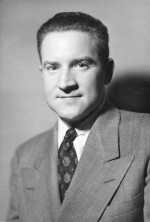Column Name
Title
Eminent composer and educator Robert Eugene Ward (’46, orchestral conducting, composition) died of natural causes at his home in Durham, N.C., on April 3. He was 95. Ward, who won a 1962 Pulitzer Prize for his opera The Crucible, served on the Juilliard faculty from 1946 to 1955 teaching Literature and Materials of Music. The following year he became the assistant to President William Schuman.
Body
Born and raised in Cleveland, Ward was a boy soprano who started teaching himself composition and harmony in high school. After graduating from the Eastman School of Music, where he switched from studying public school music to composition, Ward started graduate school at Juilliard in 1939 but left for Army service with a detour to Tanglewood, where he studied composition with Aaron Copland. After graduating from Army Music School, he became the conductor of the Seventh Infantry Division Band. During this period he met and married Mary Bernard, and the couple went on to have 5 children, all of whom survive him, as do 11 grandchildren and 3 great-grandchildren. Mary Ward died in 2006.
After the war ended, Ward returned to Juilliard where, over the years, he studied composition with Frederick Jacobi, orchestration with Bernard Wagenaar, and conducting with Edgar Schenkman (Diploma ’34, orchestral conducting) and Albert Stoessel.
While Ward was teaching and working in the Juilliard administration, he also taught at Columbia and was the director of the Third Street Settlement Music School, conductor of the Doctors Orchestral Society, and president of the American Composers Alliance. In 1956, he was named executive vice president and managing editor of classical music publisher Galaxy Music; while there he continued composing, recording, and writing about music.
In the early 1960s, Ward was involved in the establishment of what is now the University of North Carolina School of the Arts, the first public residential conservatory for middle- through graduate-school students in the U.S. Founded by Juilliard faculty member Vittorio Giannini, it opened in 1965 and after Giannini died the next year, Ward was asked to be president (the title was later changed to chancellor), a role in which he served until 1974. Under his tenure the school doubled in enrollment and faculty and was incorporated into the University of North Carolina. Ward taught in Duke University’s music department starting in 1975. After his retirement from Duke, in 1987, he continued composing and his works remain in the repertory. The Crucible was performed most recently by the Sarasota Opera in 2011; in February of this year, the North Carolina Symphony played his Jubilation Overture. Ward sat in the first row and gave a bow at the end.
Ward’s early influences were Debussy, Ravel, Hindemith, Stravinsky, and jazz, and while he would become known as a musical traditionalist and a neo-Romantic, he didn’t hesitate to incorporate tone rows into his music. Over the years he composed eight operas, seven symphonies (the first, which was premiered at Juilliard in 1941, won the Juilliard Publication Award), numerous choral and chamber works, and a ballet. One of his works for children, called Jonathan and the Gingery Snare, after his oldest son, was premiered at a New York Philharmonic Young People’s Concert in 1950 (it was conducted by former Juilliard faculty member and alum Igor Buketoff). Ward, a self-described eclectic and truly American composer, told the Cleveland Plain Dealer music critic Donald Rosenberg in 1994, “I’ve gone on writing what I’ve wanted to write. You’ve got to write your own music.”
Along with fellow Juilliard alum Risë Stevens, Ward was a National Endowment of the Arts Opera Honoree in 2011.
Extolled as being plainspoken, down-to-earth, and kind, Ward also had a keen sense of humor. In 1997, he told the Raleigh, N.C., Spectator that while teaching at Juilliard, “I wondered whether musicians would recognize themes when the rhythm was entirely different from the original, so I took a melody that I knew the students would all know and rewrote it, violating the usual stresses and giving it another rhythmic form. I dictated it to them and said, ‘I want you to look at that and see if it reminds you of any other melodies.’ Well, they thought and they thought, but they didn’t recognize it at all—except that they felt it was familiar. I then played it in the original form. It was ‘The Star-Spangled Banner.’”





